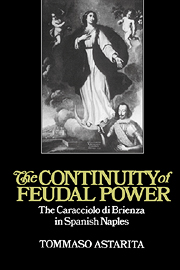Book contents
- Frontmatter
- Contents
- List of plates, figures, and maps
- List of tables
- Acknowledgments
- Note on abbreviations and measurements
- Introduction
- 1 The Caracciolo di Brienza
- 2 Structure and evolution of an aristocratic patrimony
- 3 The management of an aristocratic landed patrimony
- 4 The feudal lord and his vassals: between traditional paternalism and change
- 5 Aristocratic strategies for the preservation of family wealth
- 6 Offices, courts, and taxes; the aristocracy and the Spanish rule
- Conclusion
- Glossary
- Appendix on sources
- Bibliography
- Index
- CAMBRIDGE STUDIES IN EARLY MODERN HISTORY
1 - The Caracciolo di Brienza
Published online by Cambridge University Press: 28 August 2009
- Frontmatter
- Contents
- List of plates, figures, and maps
- List of tables
- Acknowledgments
- Note on abbreviations and measurements
- Introduction
- 1 The Caracciolo di Brienza
- 2 Structure and evolution of an aristocratic patrimony
- 3 The management of an aristocratic landed patrimony
- 4 The feudal lord and his vassals: between traditional paternalism and change
- 5 Aristocratic strategies for the preservation of family wealth
- 6 Offices, courts, and taxes; the aristocracy and the Spanish rule
- Conclusion
- Glossary
- Appendix on sources
- Bibliography
- Index
- CAMBRIDGE STUDIES IN EARLY MODERN HISTORY
Summary
I can trace my ancestry back to a protoplasmal primordial atomic globule. Consequently, my family pride is something inconceivable
The MikadoThe early modern Neapolitan aristocracy shared many characteristics with its Northern Italian and European counterparts. It acknowledged the superior political authority of a government that in turn recognized the aristocracy's predominant social role. It was the wealthiest group in society and the source of its wealth lay primarily in its landed patrimony, as was becoming increasingly true of most Northern Italian patriciates. Though it did not always reside in the capital, to a large extent the Neopolitan aristocracy shared in the urban culture and lifestyle common among Venetian or Florentine patricians. Finally, it occupied a preeminent share of the military and bureaucratic offices the early modern states needed to man.
But the aristocracy of the kingdom of Naples was considerably different from the Venetian or Florentine patriciates, as well as from other Italian and Western European nobilities, in its feudal character. Although there were feudal lands, which endowed their owners with feudal rights and exemptions, in all the Italian states, in none of them were feudal institutions and powers so widespread, pervasive, and influential as in the three kingdoms among them — Naples, Sicily, and Sardinia.
- Type
- Chapter
- Information
- The Continuity of Feudal PowerThe Caracciolo Di Brienza in Spanish Naples, pp. 19 - 35Publisher: Cambridge University PressPrint publication year: 1991

